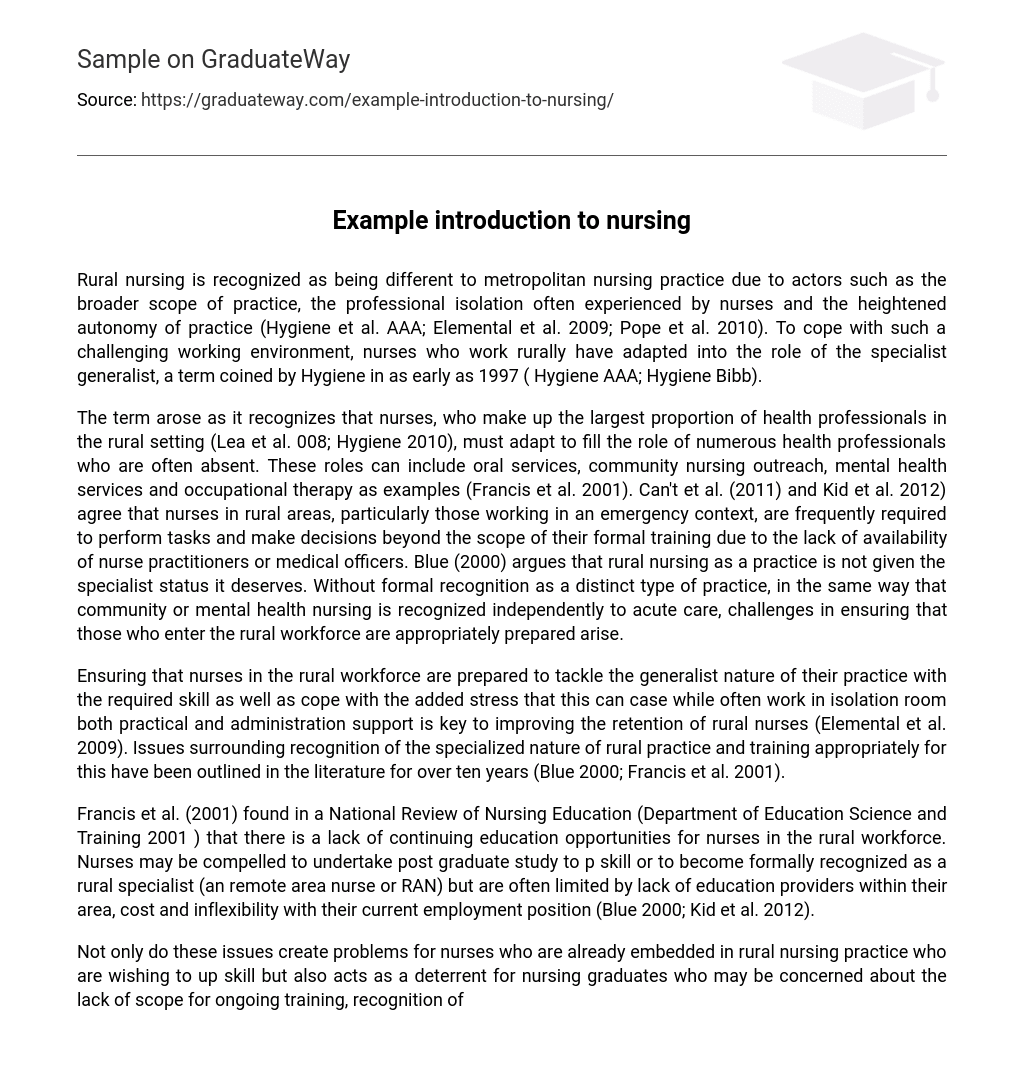Rural nursing is recognized as being different to metropolitan nursing practice due to actors such as the broader scope of practice, the professional isolation often experienced by nurses and the heightened autonomy of practice (Hygiene et al. AAA; Elemental et al. 2009; Pope et al. 2010). To cope with such a challenging working environment, nurses who work rurally have adapted into the role of the specialist generalist, a term coined by Hygiene in as early as 1997 ( Hygiene AAA; Hygiene Bibb).
The term arose as it recognizes that nurses, who make up the largest proportion of health professionals in the rural setting (Lea et al. 008; Hygiene 2010), must adapt to fill the role of numerous health professionals who are often absent. These roles can include oral services, community nursing outreach, mental health services and occupational therapy as examples (Francis et al. 2001). Can’t et al. (2011) and Kid et al. 2012) agree that nurses in rural areas, particularly those working in an emergency context, are frequently required to perform tasks and make decisions beyond the scope of their formal training due to the lack of availability of nurse practitioners or medical officers. Blue (2000) argues that rural nursing as a practice is not given the specialist status it deserves. Without formal recognition as a distinct type of practice, in the same way that community or mental health nursing is recognized independently to acute care, challenges in ensuring that those who enter the rural workforce are appropriately prepared arise.
Ensuring that nurses in the rural workforce are prepared to tackle the generalist nature of their practice with the required skill as well as cope with the added stress that this can case while often work in isolation room both practical and administration support is key to improving the retention of rural nurses (Elemental et al. 2009). Issues surrounding recognition of the specialized nature of rural practice and training appropriately for this have been outlined in the literature for over ten years (Blue 2000; Francis et al. 2001).
Francis et al. (2001) found in a National Review of Nursing Education (Department of Education Science and Training 2001 ) that there is a lack of continuing education opportunities for nurses in the rural workforce. Nurses may be compelled to undertake post graduate study to p skill or to become formally recognized as a rural specialist (an remote area nurse or RAN) but are often limited by lack of education providers within their area, cost and inflexibility with their current employment position (Blue 2000; Kid et al. 2012).
Not only do these issues create problems for nurses who are already embedded in rural nursing practice who are wishing to up skill but also acts as a deterrent for nursing graduates who may be concerned about the lack of scope for ongoing training, recognition of their skills or promotions (Hygiene Bibb; Kid et al. 012). Can’t et al. (2011) highlights that the need for rural nurses to have access to formal training programs that allow for the recognition of their specialist skills is fundamental to maintaining a functioning and thriving nursing workforce in rural Australia.
The varied skill set discussed above, the physically demanding nature of rural nursing work and expectations to work outside of practice hours are all factors identified that reduce the appeal of rural nursing (Blue 2000; Hygiene AAA; Lea et al. 2008; Stain & Banner 2012). Graduates who are considering work in the aural setting post university are often deterred by the lack of support that many of their peers have experienced.
Due to the busy nature of rural practice and the professional isolation, many nurses who enter the rural workforce as a graduate or otherwise struggle to settle into the new practice due to the lack of preceptor availability (Lea & Cruickshank 2005; Lea et al. 2008; Hygiene 2010; Stain & Banner 2012; Doodle-Simmons 2013). Furthermore, another issue limiting recruitment of rural nurses is that rural nursing practice is not seen as a career pathway in itself (Blue 2000, Lea et al. 08) despite growing recognition of its specialized status (Blue 2000; Francis et al. 2001; Hygiene AAA; Hygiene Bibb). Despite the hardships of rural nursing such as workplace stress, feeling alone and a lack of anonymity in the community many nurses find practicing in a close knit community that is isolated from metropolitan health care services to be particularly rewarding (Lea et al. 2008).
Hygiene (Bibb up. 181) offers that many nurses are attracted to rural work because of the lifestyle it offers, the stability of employment and the ability to work with a heightened sense of autonomy. This IEEE is supported by Stain and Banner (2012) who found that it is the challenge of rural practice that is both appealing and off putting to new graduates who are considering entering the rural workforce.
Furthermore, they also found that nurses working in rural communities often feel valued and appreciated by the community in which they work which may not be as apparent to those working in metropolitan clinical settings (Stain & Banner 2012). The most consistent theme throughout this examination of issues resulting in low recruitment and retention of registered nurses in the rural setting is that urges are not well prepared for the unique components of rural practice.





